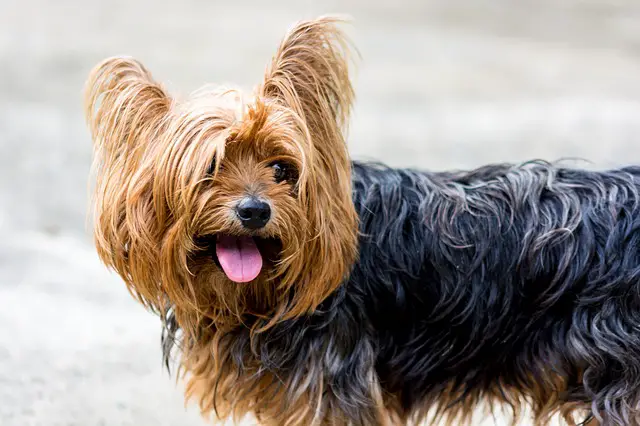As a Yorkie parent, it is possible that you’ve asked yourself the question ‘why do Yorkies have bad breath’ quite often.
Indeed, this small dog is notorious for bad breath. And that is the topic of this post.
In this guide, we will cover:
- Tips to prevent bad breath or halitosis in Yorkies
- 10 main reasons why do Yorkies have bad breath?
- And more…
Why Do Yorkies Have Bad Breath?
Most Yorkies have bad breath or halitosis due to periodontal disease or lack of oral hygiene. The Yorkie breed is as such prone to bad breath. A poor diet or underlying health issue can also cause bad breath in Yorkies. If a Yorkie eats out of the trash, then too it could have bad breath.
10 Reasons Why Do Yorkies Have Bad Breath?
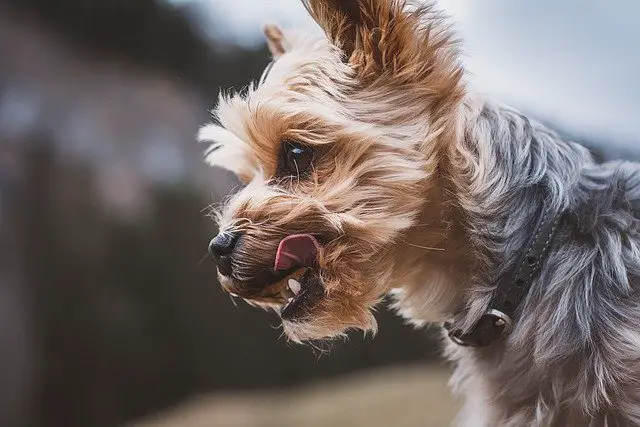
Here are some of the most common reasons why do Yorkies have bad breath
1. Periodontal disease
According to Dr. Jamie Richardson of Small Door Veterinary, many small dog breeds like Yorkies and Chihuahuas are prone to periodontal disease. This is mainly because these breeds are brachycephalic and short snouted.
Their small teeth trap food traces easily and the accumulation of food bits between the teeth may be harder to brush out. With time, this rotten food is mixed with saliva and bacteria and hardens into plaque and tartar.
In addition to bad breath or halitosis, some of the most common signs of periodontal disease in Yorkies, are:
- Tooth abscess – Small dogs like Yorkies can have abscessed teeth but they hide it well so their owners never suspect a problem. This can worsen the issue and increase bad breath.
- Broken, missing teeth
- Excessive drooling
- Bleeding gums
Since Yorkies have very small bone mass anchoring the tooth, tooth loss from periodontal disease is also very common.
Over time, these problems worsen. Your Yorkie won’t be able to chew hard treats and food. It might paw its face, or even have a bloody drool running down its face.
If you see any of the above signs, please see your vet right away. Many early signs of periodontal disease can be treated to prevent complications like tooth loss.
2. Lack of oral hygiene
Dr. Katie B. Kangas, DVM states that small dog breeds like Yorkies are more prone to dental issues and need even more oral care because of their small skulls, genetic makeup, and the anatomy of their mouth and face.
That is why she urges pet parents with small dog breeds like Yorkies to get regular dental exams for their pets starting at the age of one.
There is no doubt that it is easier to “spoil” cute and small dog breeds like Yorkies. Their lovable appearances let them get away with anything. Resultantly, most pet parents aren’t strict enough with their small dogs and do not get them used to teeth brushing and grooming since puppyhood.
A lack of oral hygiene can cause bad breath in Yorkies. The mechanical action of brushing is very important to disrupt the bio-film of plaque, states Dr. Kangas.
She further mentions that it is not just “occasional” brushing – but daily brushing that is important for small dogs like Yorkies.
Dr. Kangas also encourages Yorkie parents to schedule professional dental cleaning on a regular basis since nearly 60% of dental diseases begin under the dog’s gumline and need X-rays to detect them. Early detection can prevent many issues from spiraling out of control.
3. Poor diet

According to Dr. Tammy Hunter, DVM of VCA Hospitals, nutrition could, to some extent, prevent dental issues and bad breath in all dog breeds.
She states that dog food’s texture and makeup affect the environment of your Yorkie’s mouth. Dry dog food, for example, can help maintain tissue integrity, stimulate saliva production, and alter plaque bacteria metabolism, since it helps with mechanical cleansing of tooth surfaces.
If your Yorkie is fed wet or soft food, then such food has a greater risk of sticking to the gums and teeth and especially in between crowded teeth that are characteristic of small brachycephalic dog breeds.
In case you fail to brush your little dog’s teeth daily, then it can result in cavity, plaque, and tartar formation which can result in very bad breath.
Dr. Hunter therefore urges dog parents to seek help from a vet and select a diet proven to be effective in enhancing canine oral health. Alternatively, she recommends selecting a dental diet that has been approved by the Veterinary Oral Health Council (VOHC).
Also Read: Best Dog Food for Yorkies with Allergies
4. Underlying medical problems
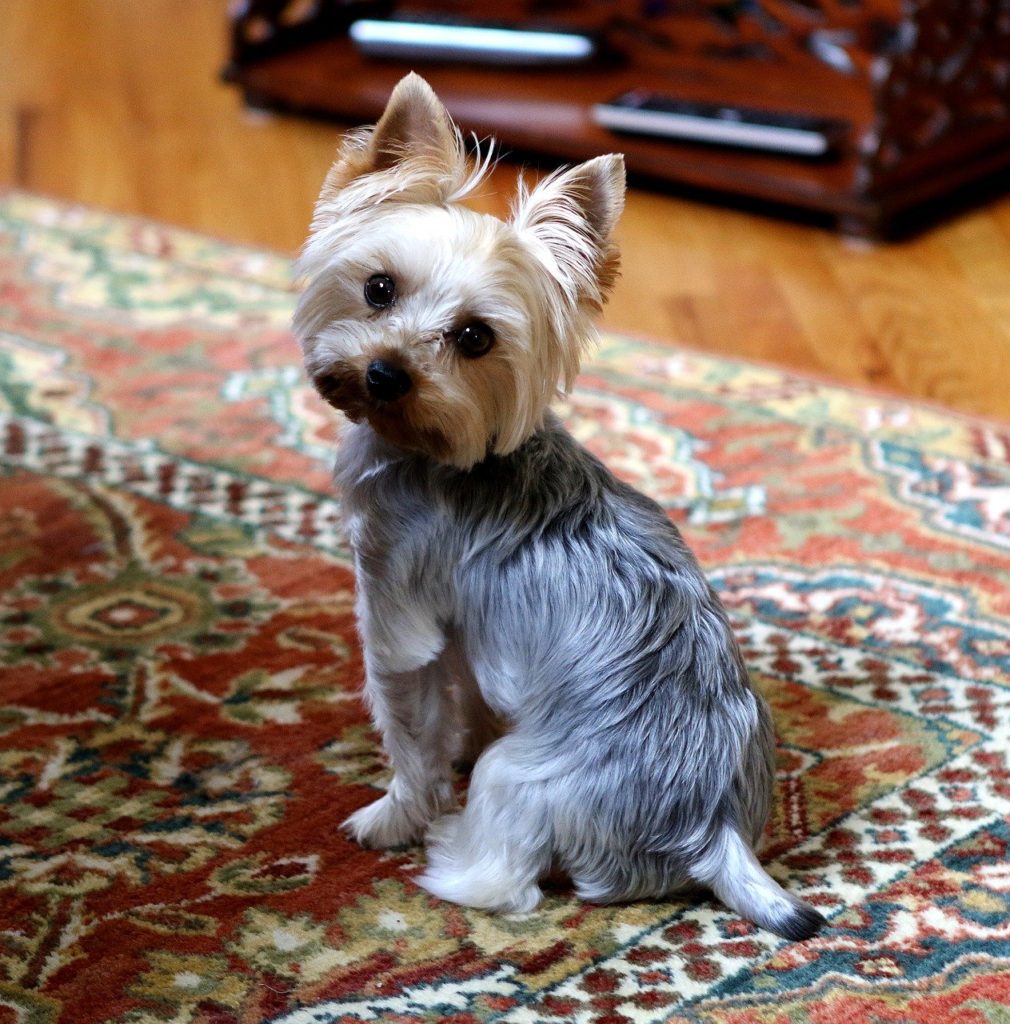
According to the AKC, if periodontal disease isn’t the cause of halitosis or bad breath in your Yorkie, then other medical issues could be the culprit. The organization enlists the following health problems as probable causes of halitosis in dogs:
Diabetes
In Yorkies with diabetes, the breath won’t be foul; rather it will be sweet-smelling and sickly-fruit-like or even slightly alcoholic. The breath can be best described as nail polish or acetone-like. This is attributed to the higher ketone levels in the diabetic pet’s blood. Other signs of diabetes in dogs are increased thirst, appetite changes, weight loss, etc.
Liver disease
Fetor hepaticus (foul odor that occurs in later stages of liver disease) causes the affected dog’s breath to smell musty, foul, and like decaying matter. It happens because the liver is no longer able to filter out toxins. In addition to halitosis, the affected dog might have vomiting, reduced appetite, and yellow eyes and gums.
Kidney failure
If your Yorkie’s breath smells strongly of chemicals, ammonia, or urine, it could be a symptom of kidney disease. It occurs because the kidneys aren’t functioning properly and the urea in the dog’s body isn’t being eliminated. Other signs of kidney disease in dogs are pale gums, significant weight loss, and vomiting.
Sinus infections/ nasal tumors
Dr. David Harris, BVSc, MRCVS also attributes bad breath to sinus infections or, in rare cases, nasal tumors in dogs. The diseases of the respiratory tract produce pus and mucus which trickle down the throat and into the mouth, resulting in very bad breath. Do not ignore excess sneezing, wheezing, and difficulty breathing in your pet and have your vet examine it right away.
Gastrointestinal issues
In rare cases, bowel obstruction, acid reflux, indigestion, and gastrointestinal issues can also help answer the question: why do Yorkies have bad breath. This is mainly due to the fact that the bad smells do not move in the right direction in the intestinal tract and, instead, move upwards to be smelled through your pet’s breath. Never ignore persistent bad breath in your Yorkies as it can indicate some kind of issue in the stomach.
Infections of the mouth or lip folds
Infections of the mouth- mainly lip stomatitis, lip dermatitis, lip wounds, fungal stomatitis, trenchmouth, glossitis, mouth burns, warts, inflamed salivary glands, dry mouth, and papillomas can all contribute to a canine bad breath. Causes of these infections are varied. That is why complete oral examination is needed from time to time as many of these issues can be caught early on and prevented from worsening.
5. Imbalanced oral or gut microbiome

Most people think that it is a one-way street from the mouth to the gut. However, that isn’t the case and oral health and gut health are very much connected.
If your Yorkie has a poor immune system, then the bad bacteria in its gut can out-number the healthy or good bacteria. This imbalance of microbiome can also occur in the mouth. Both imbalances (gut and oral) result in gas formation which is eventually absorbed into the blood-stream and exhaled out as bad breath.
Many factors can cause imbalances in the oral and gut microbiome such as environment, genetics, certain drugs, and poor diet.
To balance your Yorkie’s microbiome, you will need to make dietary changes, add probiotics to its diet, exercise your dog, reduce stress, and make sure it gets enough sleep.
6. Brachycephalic syndrome
Yorkies are brachycephalic – so their teeth tend to grow sideways and hard pieces of food can easily get stuck there and could even stay there for years.
Conventional cleaning procedures like regular brushing can sometimes be inadequate in completely eliminating the stuck food bits. So, if you are wondering why do Yorkeis have bad breath despite the fact that you are fastidious in taking care of its brushing, then, you’re not to blame.
Their small squashed-in faces often lead to an overcrowding of teeth. This leads to plaque formation of upper and lower molars or back teeth. Over time, this can result in bad breath.
Professional dental cleaning is one of the best ways to prevent this type of halitosis. You can also consider using dental water additives which may be more effective in eliminating tartar and plaque compared to normal brushing.
Also, provide your dog with some chew sticks or dental toys although these may not reach the back teeth, they could, to an extent, reduce plaque and tartar due to their abrasive textures.
Also Read: 14 Hygiene Tips to Keep Your Dog From Stinking!
7. Eating things it isn’t meant to eat – pica
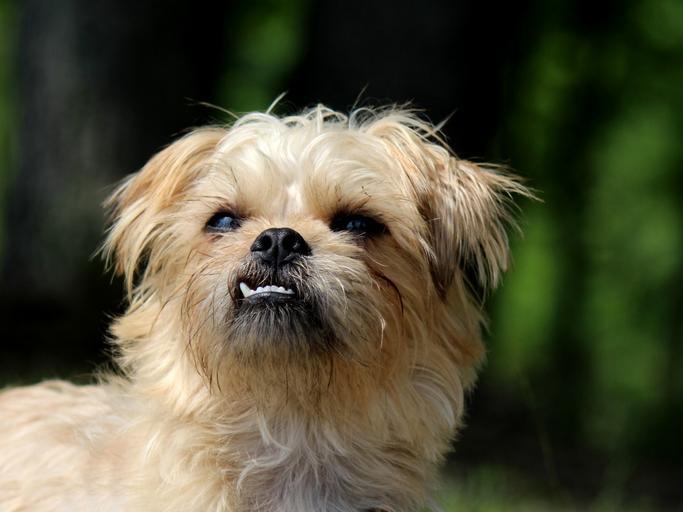
Dogs often eat non-food items. This is called pica and many dogs indulge in it. Often pica is linked to behavioral disorders and may be a response to stress, routine changes, or boredom.
Dogs with pica are known to eat grass, buttons, small objects like coins, plants, paper, trash, and even poop.
Poop eating or coprophagia is one of the most common reasons behind bad breath in dogs. It is especially seen in young pups, although pregnant dogs can also eat poop due to vitamin deficiency, hunger, etc.
Some Yorkies eat their own feces or they might eat other dogs’ feces too. As a dog owner, you must get rid of this habit if you want to prevent bad breath.
Some remedies to prevent pica and coprophagia in Yorkies are:
- Overcome nutritional deficiencies
- Add taste deterrents to the dog’s food – these make the poop taste bad so dogs do not feel like eating it.
- Muzzling or crating it – if it eats poop on walks or when the owners are not around.
- Exercising and mentally stimulating your Yorkie to prevent pica arising out of boredom, separation anxiety, etc.
Also Read: 14 Ways to Clean a Dog’s Mouth After Eating Poop
8. Bad breeding
Small dogs like Yories are much in demand. This has resulted in unethical over-breeding and breeders often breed dogs with health issues to meet the high-demand for puppies.
The resulting puppies then tend to have the same health issues including oral problems, overcrowding of teeth, and other congenital defects.
This is one of the reasons why so many Yorkies have bad breath resulting from congenital periodontal disease.
9. Evolutionary trait
We must not forget that all dogs have evolved from wolves. However, as the need for small companion dogs increased, humans started breeding smaller and smaller dogs – Yorkies being one of them.
Although the skull size of dogs was reduced, the number of teeth remained the same. All dogs have 42 teeth (which is 10 more than what we humans have!) Imagine a small Yorkie’s mouth containing 42 teeth! There is bound to be overcrowding.
Add to this the fact that many small dogs like yorkies often do not lose all of their baby teeth. The baby teeth remain inside their mouth while the adult teeth spring next to them or even on top of them.
This results in an overcrowding of teeth which causes food particles to get stuck in them. No amount of brushing or feeding dry food or administering chew sticks is going to fully eliminate the food stuck in between the teeth and this is one of the causes of dental cavities, periodontal disease, and subsequent bad breath..
10. Inadequate grooming
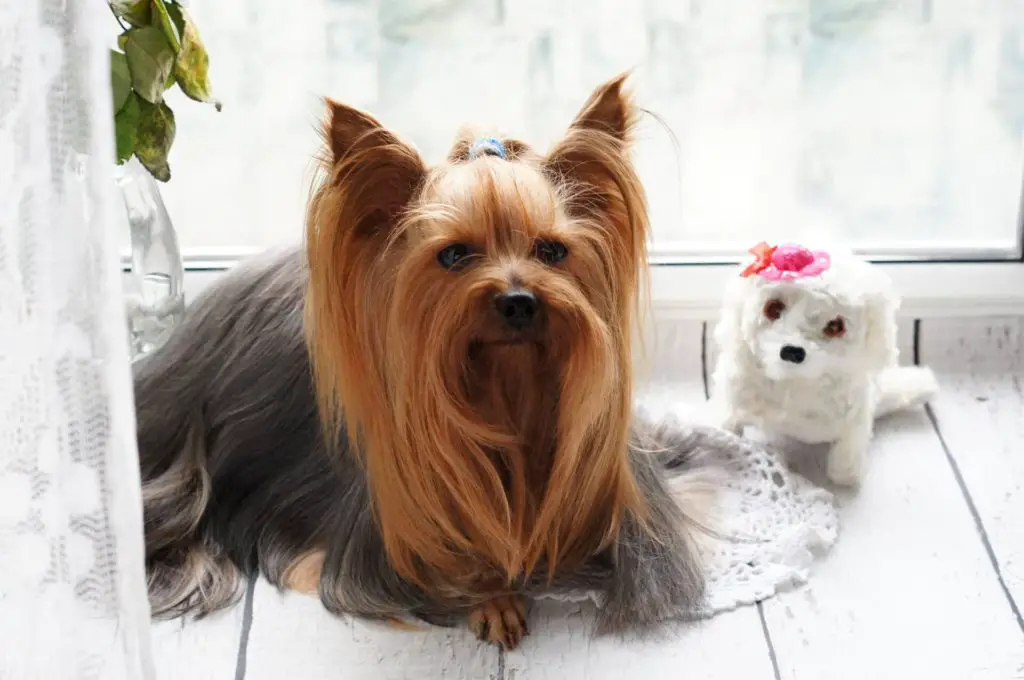
A Yorkie has a lot of facial hair and its long ‘beard’ is one of the breed’s trademark characteristics.
If your Yorkie’s facial hair is not groomed properly, then it could trap food particles and result in foul breath.
That is why you need to trim your dog’s facial hair too so it can remain clean and prevent bad odor.
Check out our guide on How to Groom a Yorkie Face?
Never ignore persistent bad breath in your Yorkie and have it evaluated right away.
